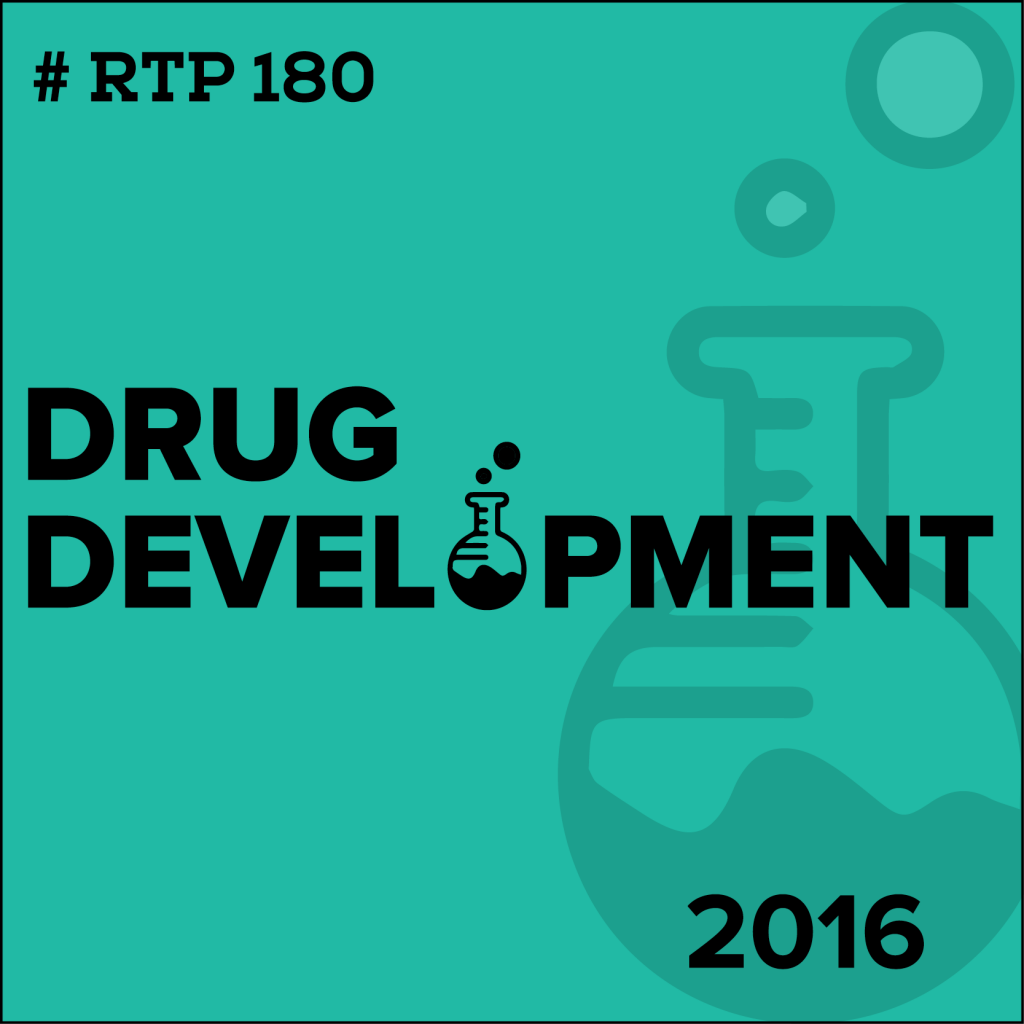
Most people take it easy in December. The year is winding down, they are ready for a break from the daily grind and they begin to drift off into their “holi-daze,” but not us! We finished 2016 with one of the most intense RTP 180 topics that we’ve ever had, Drug Development.
If you take a look at RTP’s history in drug development, you don’t have to look very far to discover several earth-shattering discoveries. Take Taxol, hailed by the National Cancer Institute as the most important new anti-cancer drug of the past 15 years, or AZT, a drug used to fight HIV-AIDS.
It’s no secret that RTP houses some of the smartest minds in the world. We were fortunate to have the following three minds join us:
Alex Dusek – Argos Therapeutics
Alex Dusek, through his work with Argos Therapeutics, is working to develop the first precision immunotherapy for oncology (cancer). Dusek explains that, “We are all different and in medicine we haven’t made enough progress in treating everyone differently. It can’t be a one-size-fits-all model.”
For example, the current way a drug is tested is to run a trial with a placebo and bucket people into responses (positive or negative outcomes). If your drug has a positive outcome on average over a negative outcome, your chances to get approved increase. At Argos, their mission is to figure out why certain people had a positive reaction and why others had a negative.
During his talk, Dusek explains several key factors that go into his research towards this goal. You’ll have to watch the video HERE to learn about those factors. Plus…I’m not so you want to read through me trying to piece it all together.
Dr. Doris Rouse – RTI International
Doris took us to school on Tuberculosis Drug Development and how a public-private partnership can work. If you were at the event you would have heard me say “Doris and I would be friends, best friends.” I meant every single word of that. Why wouldn’t you be friends with someone who opens up her talk with a joke? “Once you’ve seen one shopping center, you’ve seen them-all” Get it, “the mall”? Anyways…
The decrease in industry investment in early stage research and development in certain therapeutic areas such as antibiotics has prompted the need for more public-private partnerships. These types of partnerships allow organizations the chance to collaborate and share data along with knowledge and resources.
Tuberculosis is one of the oldest of human diseases that we know of and is often referred to as the “white plague” or the “graveyard cough,” which is why the need for extensive collaborative research is mission critical.
You’ll have to watch Doris’ video of her entire talk HERE to see how it all unfolds.
Alex Tropsha – UNC School of Pharmacy
Alex and team are out to challenge the long standing approach we currently use to predict the toxicity of chemicals.
The current way toxicity is measured and studied is done by:
- Looking for patterns, or a shared chemical group, within chemicals that show signs of toxicity.
- From there, we can comprise a statement such as, “all chemicals that have this particular group are toxic.”
- Once we have studied and made this statement, Tropsha goes on to jokingly explain that it’s simple from this point on. “We publish, we get grants, we become famous, and we get more grants. We sell it to the FDA and that’s when become really rich and really famous!”
This long-standing approach is outdated and has its share of flaws in the method of which toxicity of chemicals is predicted.
Tropsha fills us in on their method and how it differs from the current approach. Watch his entire talk HERE.
Whew. What a doozy of a RTP180. I’m no researcher, or hold a PHD of any kind, but I hope I at least was able to make heads or tails out of this month’s 180 presentations. I encourage you to watch the videos as the presenters do a much better job of explaining their crafts than I could ever do.
It has been a wonderful year full of great 180 talks. If you missed a few or are new to the RTP180 program, you can always go back and watch the talks on a YouTube channel. I hope you all enjoy this upcoming holiday season and we will see you next year for a whole new set of topics!